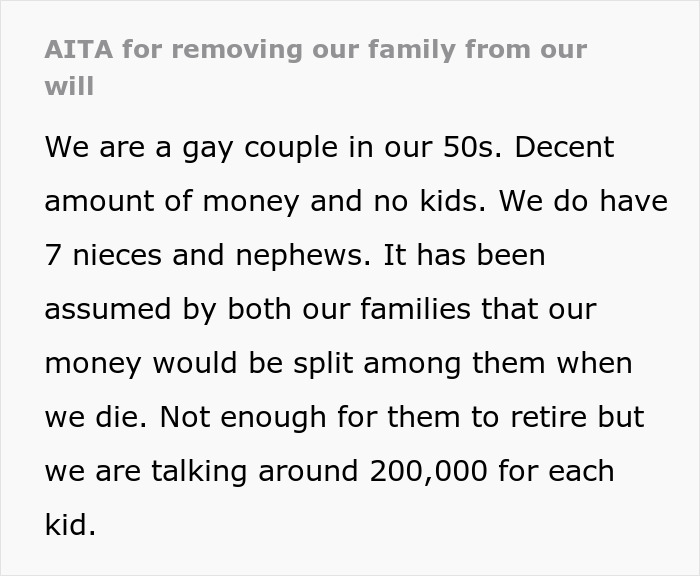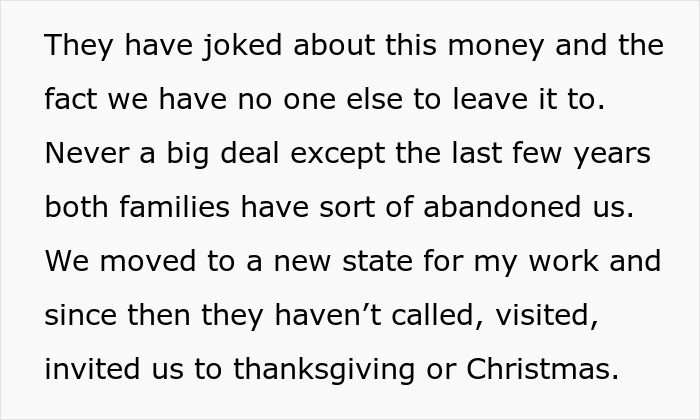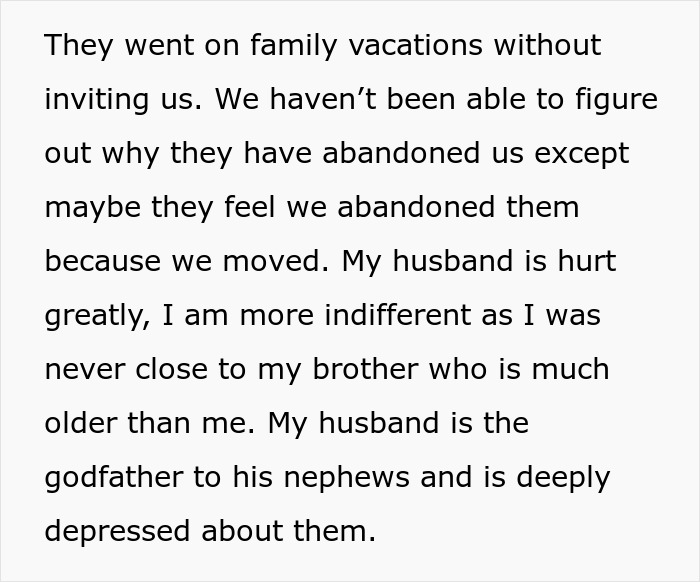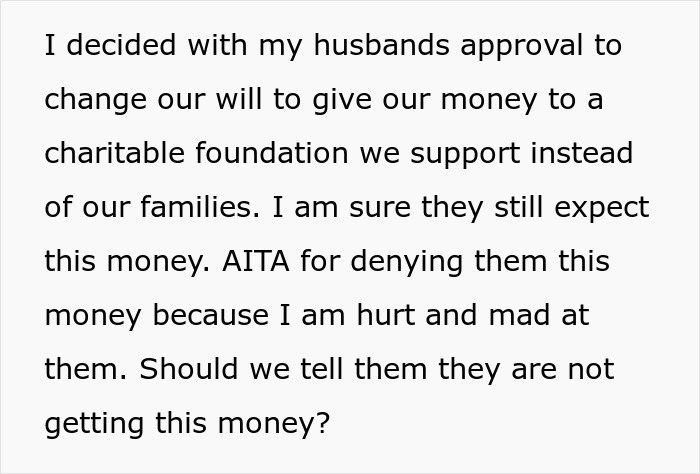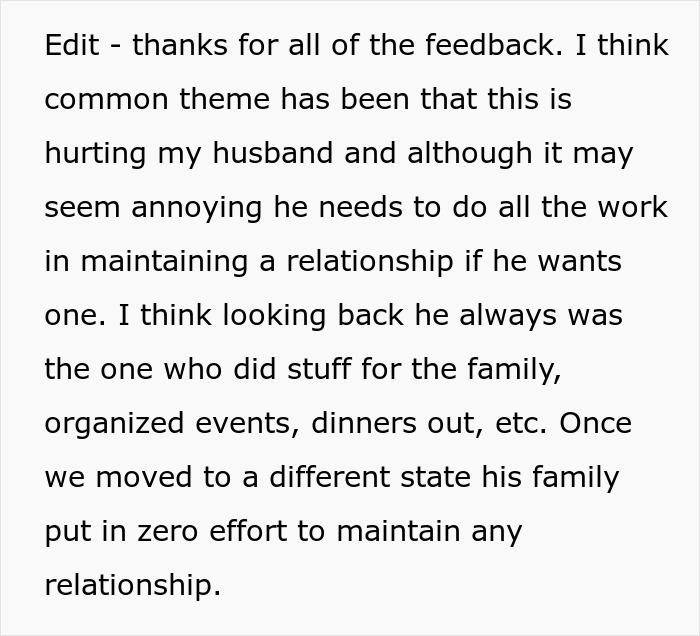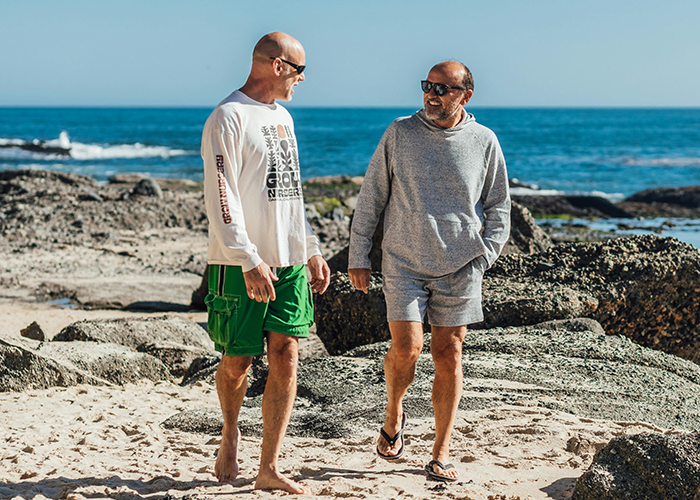“AITA For Removing Our Family From Our Will?”
A person has every right to leave their inheritance to whomever they choose, be it their family, a close friend, or a charitable cause. And it’s also in their free will to cut someone out of it if they feel like they have fallen out with them.
Similar to redditor Xiphoid77 and his husband, who made the unfortunate decision to remove their family from their will, as they abandoned the couple ever since they moved to a new state. Their nephews and nieces are still very much expecting the money, so the author turned to the “AITAH” subreddit, asking if he’s wrong for denying the money.
The wealthy gay couple had every intention of leaving their inheritance to their relatives
Image credits: Kindel Media / pexels (not the actual photo)
But when they started to feel abandoned, they redirected their assets to a charitable cause
Image credits: Nicole Michalou / pexels (not the actual photo)
Image credits: Andrea Piacquadio / pexels (not the actual photo)
After receiving many questions, the author added some more details
Image credits: xiphoid77
Excluding someone from a will
Looking to disinherit a family member isn’t as unusual as we might think. Statistics show that around 30% of deceased people remove family members entirely from the will or unequally distribute assets.
If an individual intends to exclude someone from their will, it’s important to make it legal and absolutely clear. A crossed-out name on a piece of paper, unfortunately, isn’t going to cut it. Most heirs don’t have inheritance rights (except children and spouses), so disinheriting an extended relative can be as simple as not mentioning them in the will in the first place. In the case of adult kids and partners, one should go through the legal process and include this direct information in the will.
However, anyone can oppose a testament and claim they deserve a portion of the inheritance because of some verbal promise. Even though they are unlikely to succeed, the time and emotional stress on the rightful heir should be enough to avoid it. The likelihood of someone doing this can be reduced by leaving them a small financial or sentimental gift rather than nothing at all. It’s even possible to include a no-contest clause that says the present is to be taken away if the will is objected.
There are many rational reasons to disinherit someone from a will, like estrangement or divorce. Sometimes drastic changes in health or financial needs may sway people to disinherit others, so more of the wealth goes to those who need it more. On the other hand, the deceased may decide to exclude someone who’s known to be irresponsible with money.
Gifts that are given to people while they’re still alive, like a down payment on a house, can also, in return, disinherit one from any further bequeathing. There are times when everything is left to a charitable cause for a variety of reasons, including the ones listed above.
Image credits: cottonbro studio / pexels (not the actual photo)
The importance of having a will or a testament
Having a testament is essential for every adult, regardless of the size of their assets. It lets them decide what happens to their money, property, and other possessions after their death. The late individual can be confident that each heir will receive exactly what they want, which also eliminates any misunderstandings or objections from other entitled people.
If a person passes away without a will, the law and certain rules decide who gets what. Every country or state has its process around this to determine whether a late person’s estate will be given to their spouse, children, parents, or siblings. While the decision is in progress, the assets are frozen until every detail is observed, which can be very time-consuming and exhausting for a loved one’s family.
Hence, it’s best to draft one, even though it means you have to confront your death. When doing so, the person has testamentary freedom (however, it’s not universal), which provides them with the liberty to leave their inheritance to whomever they choose without any legal obligation to family members or other individuals.
Image credits: Matthias Zomer / pexels (not the actual photo)
The author jumped to the comments to provide more information on the matter
Commenters decided they weren’t the wrong ones here
Some were kind enough to provide some advice
[ad_2]
A person has every right to leave their inheritance to whomever they choose, be it their family, a close friend, or a charitable cause. And it’s also in their free will to cut someone out of it if they feel like they have fallen out with them.
Similar to redditor Xiphoid77 and his husband, who made the unfortunate decision to remove their family from their will, as they abandoned the couple ever since they moved to a new state. Their nephews and nieces are still very much expecting the money, so the author turned to the “AITAH” subreddit, asking if he’s wrong for denying the money.
The wealthy gay couple had every intention of leaving their inheritance to their relatives
Image credits: Kindel Media / pexels (not the actual photo)
But when they started to feel abandoned, they redirected their assets to a charitable cause
Image credits: Nicole Michalou / pexels (not the actual photo)
Image credits: Andrea Piacquadio / pexels (not the actual photo)
After receiving many questions, the author added some more details
Image credits: xiphoid77
Excluding someone from a will
Looking to disinherit a family member isn’t as unusual as we might think. Statistics show that around 30% of deceased people remove family members entirely from the will or unequally distribute assets.
If an individual intends to exclude someone from their will, it’s important to make it legal and absolutely clear. A crossed-out name on a piece of paper, unfortunately, isn’t going to cut it. Most heirs don’t have inheritance rights (except children and spouses), so disinheriting an extended relative can be as simple as not mentioning them in the will in the first place. In the case of adult kids and partners, one should go through the legal process and include this direct information in the will.
However, anyone can oppose a testament and claim they deserve a portion of the inheritance because of some verbal promise. Even though they are unlikely to succeed, the time and emotional stress on the rightful heir should be enough to avoid it. The likelihood of someone doing this can be reduced by leaving them a small financial or sentimental gift rather than nothing at all. It’s even possible to include a no-contest clause that says the present is to be taken away if the will is objected.
There are many rational reasons to disinherit someone from a will, like estrangement or divorce. Sometimes drastic changes in health or financial needs may sway people to disinherit others, so more of the wealth goes to those who need it more. On the other hand, the deceased may decide to exclude someone who’s known to be irresponsible with money.
Gifts that are given to people while they’re still alive, like a down payment on a house, can also, in return, disinherit one from any further bequeathing. There are times when everything is left to a charitable cause for a variety of reasons, including the ones listed above.
Image credits: cottonbro studio / pexels (not the actual photo)
The importance of having a will or a testament
Having a testament is essential for every adult, regardless of the size of their assets. It lets them decide what happens to their money, property, and other possessions after their death. The late individual can be confident that each heir will receive exactly what they want, which also eliminates any misunderstandings or objections from other entitled people.
If a person passes away without a will, the law and certain rules decide who gets what. Every country or state has its process around this to determine whether a late person’s estate will be given to their spouse, children, parents, or siblings. While the decision is in progress, the assets are frozen until every detail is observed, which can be very time-consuming and exhausting for a loved one’s family.
Hence, it’s best to draft one, even though it means you have to confront your death. When doing so, the person has testamentary freedom (however, it’s not universal), which provides them with the liberty to leave their inheritance to whomever they choose without any legal obligation to family members or other individuals.
Image credits: Matthias Zomer / pexels (not the actual photo)
The author jumped to the comments to provide more information on the matter
Commenters decided they weren’t the wrong ones here
Some were kind enough to provide some advice
Read original article here

